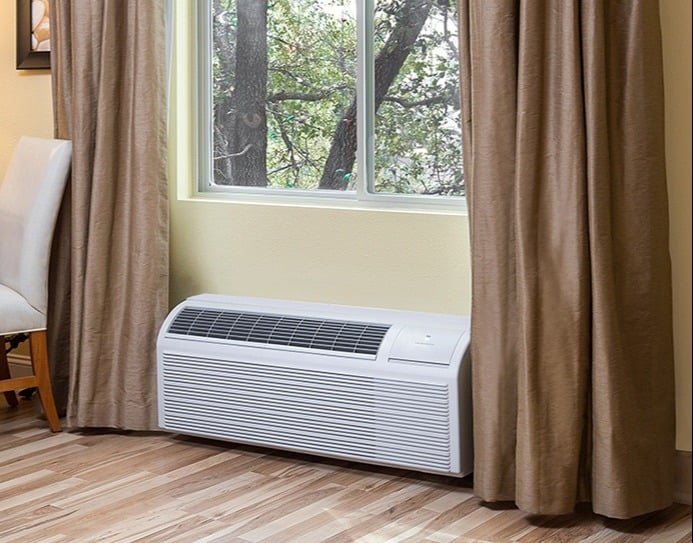The COVID-19 pandemic has many lodging customers asking, “Can I get an anti-bacterial filtration system in my PTAC unit”?
Great question! As the leader in PTAC innovation, Friedrich’s goal is to help deliver the most comfortable and healthy room air for guests. PTAC units have traditionally been viewed as providing effective and affordable individual room climate control. Friedrich is helping to evolve the PTAC market with the launch of the most advanced PTAC ever, the Friedrich FreshAire® PTAC. FreshAire® PTAC includes a real design focus on bridging the gap between PTAC, efficiency, and IAQ in an affordable packaged system.
Enter COVID-19.
This pandemic has greatly increased consumer awareness with indoor air quality and has highlighted HVAC system capabilities. Friedrich has received several requests for anti-bacterial, anti-microbial, HEPA, and high MERV filtration products for PTAC applications. Unfortunately, PTAC designs do not fit within the parameters that are needed in anti-viral solutions as they require a minimum MERV 13 and up-to MERV 19 filtration. While there are several “add-on” devices that claim to help your PTAC fight various contaminants, most can quickly be determined as ineffective or potentially detrimental to other performance aspects of the system.
While for and fit of 3rd party accessory products may appear to be acceptable in functionality, often they are not. To understand why, let discuss a quick background on filtration. MERV 7/8 filters are synthetic media air filters that trap small particles and allergens ranging between 3 to 10 microns in size. MERV 7/8 air filters are ideal for any application as they are capable of filtering dust mites, mold spores, dander, and smoke. However, when you put a filter in the airstream, the air either must pass through it or pass around it, rendering it ineffective.
Why does the filter render ineffective?
While passing through the filter material, air encounters resistance. The higher the MERV rating, the higher the resistance. When you add more resistance, you can get a bigger pressure drop across the filter, and that’s where the problems begin. PTACs are designed and rated with a specific amount of pressure drop. As the pressure drop increases, the blowers ability to effectively move air decreases. It is then, likely, that the blower will be less effective and much less efficient.
That brings up the next problem: reduced airflow. If your system is rated for a total pressure drop of 0.5 inches of water column (i.w.c.), and you use up half of it just at the filter, you’re not likely to get the amount of airflow the system was designed to deliver.
What consequences arises?
There are several different consequences that can occur because of low airflow. One important consequence is, unfortunately, reduced comfort. In the hottest and coldest weather, the system may not be able to deliver enough heating or cooling to the space. Another particular consequence of low airflow is that the air conditioner coil may get too cold and even freeze up. This starts a vicious cycle of lower and lower airflow and a colder and colder coil until the coil is just simply a block of ice. Upon freezing, the refrigerant doesn’t evaporate and goes back to the compressor in the liquid state, which can and will ultimately damage the compressor.
This brings us back to the initial proposed question of, “Can I get an anti-bacterial filtration system in my PTAC unit?” Although there are many after-market IAQ solutions being touted as superior performers with the capture and/or kill technologies taking advantage of the high IAQ awareness. Achieving a higher MERV rating like 8r even 13with a traditional filter would place a significant strain on the system in the ways mentioned above.
However, if you were looking for an after-market IAQ solution I will encourage you to check for these two important factors:
- Make sure that your system is capable of handling the extra pressure drop and CFM restrictions.
- Check with the manufacturer to see what IAQ products are certified for use with the equipment.
As mentioned before, Friedrich’s goal is to help deliver the most comfortable and healthy room air for guests. Our PTAC units are designed, tested and rated utilizing a polypropylene mesh filter that has an effectivity rate of approximately MERV4. While we do not offer a higher MERV rating of over 4 right now, Friedrich is currently evaluating and testing to provide a multi-tier clean air solution that eliminates virus, pathogens, mold and dust spores in indoor air.
Jerad Adams - Director of Product Management



